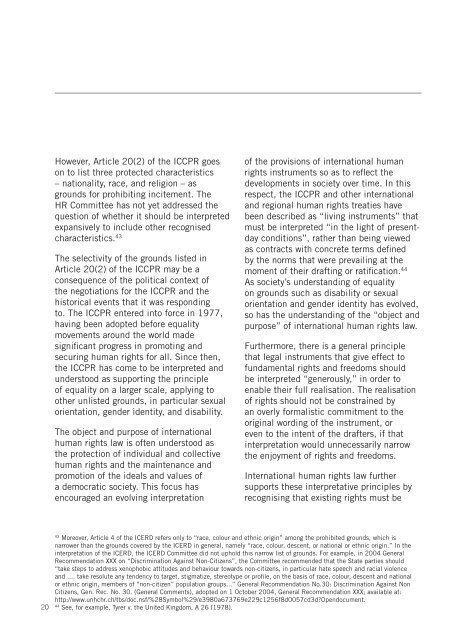ARTICLE-19-policy-on-prohibition-to-incitement
ARTICLE-19-policy-on-prohibition-to-incitement
ARTICLE-19-policy-on-prohibition-to-incitement
Create successful ePaper yourself
Turn your PDF publications into a flip-book with our unique Google optimized e-Paper software.
However, Article 20(2) of the ICCPR goes<br />
<strong>on</strong> <strong>to</strong> list three protected characteristics<br />
– nati<strong>on</strong>ality, race, and religi<strong>on</strong> – as<br />
grounds for prohibiting <strong>incitement</strong>. The<br />
HR Committee has not yet addressed the<br />
questi<strong>on</strong> of whether it should be interpreted<br />
expansively <strong>to</strong> include other recognised<br />
characteristics. 43<br />
The selectivity of the grounds listed in<br />
Article 20(2) of the ICCPR may be a<br />
c<strong>on</strong>sequence of the political c<strong>on</strong>text of<br />
the negotiati<strong>on</strong>s for the ICCPR and the<br />
his<strong>to</strong>rical events that it was resp<strong>on</strong>ding<br />
<strong>to</strong>. The ICCPR entered in<strong>to</strong> force in <str<strong>on</strong>g>19</str<strong>on</strong>g>77,<br />
having been adopted before equality<br />
movements around the world made<br />
significant progress in promoting and<br />
securing human rights for all. Since then,<br />
the ICCPR has come <strong>to</strong> be interpreted and<br />
unders<strong>to</strong>od as supporting the principle<br />
of equality <strong>on</strong> a larger scale, applying <strong>to</strong><br />
other unlisted grounds, in particular sexual<br />
orientati<strong>on</strong>, gender identity, and disability.<br />
The object and purpose of internati<strong>on</strong>al<br />
human rights law is often unders<strong>to</strong>od as<br />
the protecti<strong>on</strong> of individual and collective<br />
human rights and the maintenance and<br />
promoti<strong>on</strong> of the ideals and values of<br />
a democratic society. This focus has<br />
encouraged an evolving interpretati<strong>on</strong><br />
of the provisi<strong>on</strong>s of internati<strong>on</strong>al human<br />
rights instruments so as <strong>to</strong> reflect the<br />
developments in society over time. In this<br />
respect, the ICCPR and other internati<strong>on</strong>al<br />
and regi<strong>on</strong>al human rights treaties have<br />
been described as “living instruments” that<br />
must be interpreted “in the light of presentday<br />
c<strong>on</strong>diti<strong>on</strong>s”, rather than being viewed<br />
as c<strong>on</strong>tracts with c<strong>on</strong>crete terms defined<br />
by the norms that were prevailing at the<br />
moment of their drafting or ratificati<strong>on</strong>. 44<br />
As society’s understanding of equality<br />
<strong>on</strong> grounds such as disability or sexual<br />
orientati<strong>on</strong> and gender identity has evolved,<br />
so has the understanding of the “object and<br />
purpose” of internati<strong>on</strong>al human rights law.<br />
Furthermore, there is a general principle<br />
that legal instruments that give effect <strong>to</strong><br />
fundamental rights and freedoms should<br />
be interpreted “generously,” in order <strong>to</strong><br />
enable their full realisati<strong>on</strong>. The realisati<strong>on</strong><br />
of rights should not be c<strong>on</strong>strained by<br />
an overly formalistic commitment <strong>to</strong> the<br />
original wording of the instrument, or<br />
even <strong>to</strong> the intent of the drafters, if that<br />
interpretati<strong>on</strong> would unnecessarily narrow<br />
the enjoyment of rights and freedoms.<br />
Internati<strong>on</strong>al human rights law further<br />
supports these interpretative principles by<br />
recognising that existing rights must be<br />
20<br />
43<br />
Moreover, Article 4 of the ICERD refers <strong>on</strong>ly <strong>to</strong> “race, colour and ethnic origin” am<strong>on</strong>g the prohibited grounds, which is<br />
narrower than the grounds covered by the ICERD in general, namely “race, colour, descent, or nati<strong>on</strong>al or ethnic origin.” In the<br />
interpretati<strong>on</strong> of the ICERD, the ICERD Committee did not uphold this narrow list of grounds. For example, in 2004 General<br />
Recommendati<strong>on</strong> XXX <strong>on</strong> “Discriminati<strong>on</strong> Against N<strong>on</strong>-Citizens”, the Committee recommended that the State parties should<br />
“take steps <strong>to</strong> address xenophobic attitudes and behaviour <strong>to</strong>wards n<strong>on</strong>-citizens, in particular hate speech and racial violence<br />
and .... take resolute any tendency <strong>to</strong> target, stigmatize, stereotype or profile, <strong>on</strong> the basis of race, colour, descent and nati<strong>on</strong>al<br />
or ethnic origin, members of “n<strong>on</strong>-citizen” populati<strong>on</strong> groups...” General Recommendati<strong>on</strong> No.30: Discriminati<strong>on</strong> Against N<strong>on</strong><br />
Citizens, Gen. Rec. No. 30. (General Comments), adopted <strong>on</strong> 1 Oc<strong>to</strong>ber 2004, General Recommendati<strong>on</strong> XXX; available at:<br />
http://www.unhchr.ch/tbs/doc.nsf/%28Symbol%29/e3980a673769e229c1256f8d0057cd3dOpendocument.<br />
44<br />
See, for example, Tyrer v. the United Kingdom, A 26 (<str<strong>on</strong>g>19</str<strong>on</strong>g>78).


